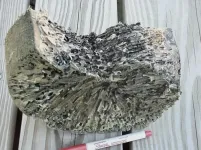(Press-News.org) Researchers have conducted a global study on the effectiveness of recently established protected areas in preventing forest loss
The study explores protected area performance by countries, with South Africa, Cambodia, Latvia, Guatemala, Uruguay, Brazil and New Zealand leading the way in the effectiveness of their protected areas
The research team estimated that overall, protected areas established between 2000-2012 prevented 86,062 square kilometers of forest loss
If all countries had protected areas that were as effective as their top-performing neighbor, then an additional 33,020 square kilometers of forests would have been saved
Machine learning found that agricultural activity, economic growth and governance were associated with effectiveness
Scientists have published a global study on the effectiveness of protected areas in preventing deforestation.
The study, published recently in Environmental Research Letters, explored the success of country-level protected areas at reducing forest loss, and used machine learning to uncover some of the factors that contribute to differences in effectiveness.
"Protected areas are a key conservation tool that are essential for stemming the tide of biodiversity and habitat loss across the Earth," said first author, Dr. Payal Shah, a research scientist at the Okinawa Institute of Science and Technology (OIST), who specializes in applying economic theory to conservation.
She added: "Scientists are calling for 30% of land and ocean to be protected by 2030. But as more and more land is placed under protection, it's increasingly important to measure how well each protected area is working, so policy makers can make more informed decisions about future conservation efforts."
For the study, the research team used satellite data of forest cover between the years 2000-2012, focusing on protected areas that had been established during this timeframe. Countries that had not placed a large enough area of land into protection were removed from the analysis.
For the 81 countries that remained in the analysis, 3.2 million square kilometers of land had been placed into protection. The research team then estimated how effective these protected areas were by comparing changes in forest cover between protected and statistically matched unprotected areas. The areas of land were matched using a wide range of factors that are important predictors of deforestation, including their distance to cities, their elevation from sea level and the slope of the land.
"The aim was to try and understand how much deforestation would have occurred in an alternative scenario - if an area had not been placed under protection," explained Dr. Shah.
The researchers found that overall, around 34,000 square kilometers of forest was lost within newly established protected areas between 2000 and 2012 - an area larger than the size of Belgium. However, they estimated that if these protected areas had not been put into place, an additional 86,062 square kilometers of forest would have also been lost. This would have meant that an area of land totaling around 120,000 square kilometers - the size of North Korea - would have been deforested.
"This means that protected areas on the whole reduced deforestation by 72%, which is great news," said Dr. Shah. "But when you start breaking down the data by country, the results are more mixed."
The scientists saw that protected areas in some countries performed significantly better than other countries within their region. Leading the way were South Africa, Cambodia, Latvia, Guatemala, Uruguay, Brazil and New Zealand, for the regions of Africa, Asia, Europe, North America, South American and Oceania, respectively.
The research team estimated that if all the other countries' protected areas had been as successful as the best performing country in their region, then an additional 33,020 square kilometers of forests would have been saved, which would have reduced deforestation within the newly established protected areas to roughly 1000 square kilometers only.
"The countries in each region are battling against similar key drivers of deforestation, such as timber logging or wildfires, so theoretically, every country has the potential to do equally well," said Dr. Shah. "But we are seeing these huge disparities in the effectiveness of their protected areas. So of course, we then want to understand the underlying factors."
One main factor found was based on the strictness of the protected areas. Strictness categories are based on the degree of human activity or use of natural resources allowed on the land. In most countries, more strictly protected areas were more effective than less strictly protected areas.
Next, the researchers fed data on the demographics, agriculture, economy and politics of each country into a machine learning algorithm, which then identified which factors were most strongly linked to the effectiveness of the country's protected area network.
Countries with high levels of economic growth were associated with higher levels of effectiveness for protected areas.
Meanwhile, countries with higher levels of agricultural activity tended to have less effective protected areas, particularly in countries that had a lower quality of governance and growing rural populations.
"This was expected as agriculture and deforestation often go hand in hand," explained Dr. Shah. "Land is a limited resource so in countries with high agricultural activity, there may be a large deforestation pressures within protected areas in countries that lack proper governance."
However, the researchers emphasized that more in-depth research needs to be done on a country-by-country basis to confirm the reasons underlying these associations.
"As a global analysis, this study allows us to pinpoint which countries are doing well, and which are doing less well," said Dr. Shah. "We can then carry out more targeted research in these countries to help support more effective conservation strategies."
INFORMATION:
The University of Alberta-led research followed more than 400 infants from the CHILD Cohort Study (CHILD) at its Edmonton site. Boys with a gut bacterial composition that was high in the bacteria Bacteroidetes at one year of age were found to have more advanced cognition and language skills one year later. The finding was specific to male children.
"It's well known that female children score higher (at early ages), especially in cognition and language," said Anita Kozyrskyj, a professor of pediatrics at the U of A and principal investigator of the SyMBIOTA (Synergy in Microbiota) laboratory. "But when it comes to gut microbial ...
Children exposed to elevated levels of air pollution may be more likely to have poor inhibitory control during late childhood and poor academic skills in early adolescence, including spelling, reading comprehension, and math skills. Difficulty with inhibition in late childhood was found to be a precursor to later air pollution-related academic problems. Interventions that target inhibitory control might improve outcomes.
Results of the study by researchers at the Columbia Center for Children's Environmental Health (CCCEH) at Columbia University Mailman School of Public Health and Columbia University Irving Medical Center are published in the journal Environmental ...
Compared with heterosexual smokers, menthol cigarette smoking is higher among lesbian, gay and bisexual cigarette smokers, according to a Rutgers-led study, especially among bisexual and lesbian/gay female cigarette smokers.
The study, published in the journal Nicotine & Tobacco Research, examined national data from 2015 to 2019 of individuals ages 18 years and older by sex and sexual identity and found that among smokers, 54 and 50 percent of bisexual and lesbian/gay females smokers preferred menthol cigarettes, respectively, compared with 39 percent of smokers overall.
This study comes in the wake of plans by the U.S. Food and Drug Administration to ban menthol cigarettes; a move that researchers say is ...
Information-rich optical imaging can provide multidimensional information to enable observation and analysis of a detected target, contributing insights into mysterious and unknown worlds. With its ability to capture dynamic scenes on picosecond—and even femtosecond—timescales, ultrafast multidimensional optical imaging has important applications in the detection of the ultrafast phenomena in physics, chemistry, and biology.
While pump-probe-based ultrafast imaging can acquire high-resolution multidimensional information, it cannot adequately capture unstable or irreversible transient scenes. Fortunately, compressed ultrafast photography (CUP), based ...
A decade after scientists discovered that lab rats will rescue a fellow rat in distress, but not a rat they consider an outsider, new research from the University of California, Berkeley, pinpoints the brain regions that drive rats to prioritize their nearest and dearest in times of crisis. It also suggests humans may share the same neural bias.
The findings, published today, Tuesday, July 13, in the journal eLife, suggest that altruism, whether in rodents or humans, is motivated by social bonding and familiarity rather than sympathy or guilt.
"We have found that the group identity ...
JUPITER, FL - The brain is wired for learning. With each experience, our neurons branch out to make new connections, laying down the circuitry of our long-term memories. Scientists call this trait plasticity, referring to an ability to adapt and change with experience.
For plasticity to happen, our neurons' synapses, or connection points, must constantly remodel and adapt, too. The mechanics underlying neurons' synaptic plasticity have become clearer, thanks to new research from the lab of Scripps Research neuroscientist Sathya Puthanveettil, PhD.
Scientists have learned that synaptic plasticity requires a complex relay from the neuron's cell body to its dendrite arms and its synapse junctions. Like a 24-hour port and highway network, an internal ...
ITHACA, N.Y. - Direct farm marketing efforts, such as farmers markets and roadside stands, are more successful in communities with more nonprofits, social enterprises and creative industries, according to a team including Cornell University researchers, who created a nationwide database of assets to help municipalities craft community-specific development plans.
While many municipalities seek to encourage direct-to-consumer (DTC) marketing - an important factor in farmers' livelihoods - the success of their efforts hinges on a wide array of community resources, or capital assets, with natural and cultural ...
AMHERST, Mass. - Humans have known for over two thousand years that shipworms, a worm-like mollusk, are responsible for damage to wooden boats, docks, dikes and piers. Yet new research from the University of Massachusetts Amherst published in Frontiers in Microbiology reveals that we still don't know the most basic thing about them: how they eat.
"It's unbelievable," says Reuben Shipway, adjunct assistant professor in microbiology at UMass Amherst, research fellow at the Centre for Enzyme Innovation at the University of Portsmouth, UK, and one of the paper's authors. "The ancient Greeks wrote about them, Christopher Columbus lost his fleet due to what he called 'the havoc which the worm had wrought,' and, today, shipworms cause billions of dollars of damage a year."
Shipworms ...
Middle- to older-aged adults who ate at least three servings of whole grains daily had smaller increases in waist size, blood pressure, and blood sugar levels over time compared to those who ate less than one-half serving per day, according to new research.
Published July 13, 2021, in the Journal of Nutrition, the study by researchers at the Jean Mayer USDA Human Nutrition Research Center on Aging at Tufts University examined how whole- and refined-grain intake over time impacted five risk factors of heart disease: Waist size, blood pressure, blood sugar, triglyceride, and HDL ("good") cholesterol.
Using data from the Framingham Heart Study Offspring ...
Philadelphia, July 13, 2021 - Consumers may have less trust in food processes that they don't understand, and animal-based foods may be subject to more uninformed scrutiny than other foods due to consumers' perception of higher risk. Dairy producers can benefit from understanding how consumers interpret unfamiliar terms and claims on dairy product labels. In a new END ...




